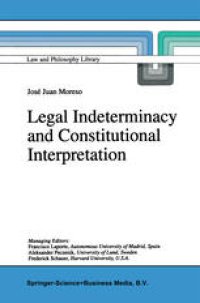
Ebook: Legal Indeterminacy and Constitutional Interpretation
Author: José Juan Moreso (auth.)
- Tags: Theories of Law Philosophy of Law Legal History, Philosophy of Law, Constitutional Law, Philosophy of Language, Logic
- Series: Law and Philosophy Library 37
- Year: 1998
- Publisher: Springer Netherlands
- Edition: 1
- Language: English
- pdf
The main purpose of this book is to offer a logical analysis of legal propositions, especially of constitutional propositions. This analysis shows the relationship between truth-conditions of legal propositions and the problem of indeterminacy. Where the law is indeterminate, legal propositions lack truth-values. The background of this approach is the philosophical debate between realism and antirealism.
The book deals with the notions of legal norms and legal systems and provides an analysis of the notion of legal indeterminacy and its relation to gaps, contradictions and the vagueness of legal concepts. It shows also that the simple model of a legal system is not sufficient to account for the complexity of legal propositions referring to legal systems of some degree of maturity. Several notions from legal dynamics are presented in order to bring to light the importance of concepts like applicability or hierarchy for the determination of the truth-value of a legal proposition. Thus the primacy of constitution becomes a central idea in the theoretical reconstruction of most contemporary legal systems; a conceptual explanation of this idea is presented and some conclusions from that explanation are drawn. Finally, a particular conception of constitutional interpretation is proposed. Special attention is paid to the relationship between interpretation and legal indeterminacy and, more specifically, to the problem of the discretion enjoyed by the organs entrusted with applying the constitution and also to the several theses that have been discussed controversially in the context of constitutional interpretation, such as the relevance of the intentions for the interpretation of the constitution and for the justification of judicial review.
The book deals with the notions of legal norms and legal systems and provides an analysis of the notion of legal indeterminacy and its relation to gaps, contradictions and the vagueness of legal concepts. It shows also that the simple model of a legal system is not sufficient to account for the complexity of legal propositions referring to legal systems of some degree of maturity. Several notions from legal dynamics are presented in order to bring to light the importance of concepts like applicability or hierarchy for the determination of the truth-value of a legal proposition. Thus the primacy of constitution becomes a central idea in the theoretical reconstruction of most contemporary legal systems; a conceptual explanation of this idea is presented and some conclusions from that explanation are drawn. Finally, a particular conception of constitutional interpretation is proposed. Special attention is paid to the relationship between interpretation and legal indeterminacy and, more specifically, to the problem of the discretion enjoyed by the organs entrusted with applying the constitution and also to the several theses that have been discussed controversially in the context of constitutional interpretation, such as the relevance of the intentions for the interpretation of the constitution and for the justification of judicial review.
Download the book Legal Indeterminacy and Constitutional Interpretation for free or read online
Continue reading on any device:

Last viewed books
Related books
{related-news}
Comments (0)